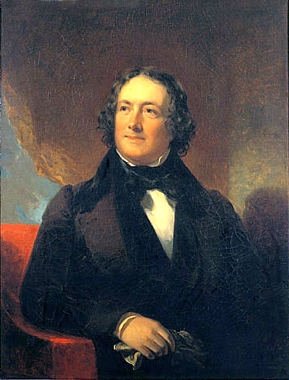
Nicholas Biddle was an American financier who served as the third and last president of the Second Bank of the United States. Throughout his life Biddle worked as an editor, diplomat, author, and politician who served in both houses of the Pennsylvania state legislature. He is best known as the chief opponent of Andrew Jackson in the Bank War.
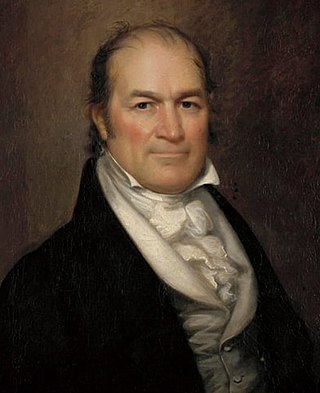
William Harris Crawford was an American politician and judge during the early 19th century. He served as US Secretary of War and US Secretary of the Treasury before he ran for US president in the 1824 election.

Joel Roberts Poinsett was an American physician, botanist, politician, and diplomat. He was the first U.S. agent in South America, a member of the South Carolina Legislature in the South Carolina State Capitol, at the state capital town of Columbia, and later a United States Representative (congressman) in the U.S. House of Representatives, serving 1821-1825. He was appointed by 6th President, John Quincy Adams as the first United States Minister to Mexico (ambassador), He replaced U.S. Army General James Wilkinson (1757-1825), who had been in the Royal Spanish colony of the Viceroyalty of New Spain as an envoy for a decade, 1816-1825. Minister Poinsett served 1825-1829.. Mexico had recently declared its independence in 1821, and formed a new brief provisional government then later as the First Mexican Empire (1823-1824), (Mexico), from the Kingdom of Spain and its longtime colonial Viceroyalty of New Spain, in the Americas portion of the world-wide Spanish Empire. He served to represent the American government during his term to the subsequent another Mexican provisional interim government and then following the First Mexican Republic regime in a tumultuous period of their history in their capital city of Mexico City.

William Orlando Butler was a U.S. political figure and U.S. Army major general from Kentucky. He served as a Democratic representative from Kentucky from 1839 to 1843, and was the Democratic vice-presidential nominee under Lewis Cass in 1848.

Amos Ellmaker was a U.S. politician, attorney, and judge from Pennsylvania. He served as the Pennsylvania Attorney General and was the Anti-Masonic vice presidential candidate in the 1832 presidential election.

Andrew Stevenson was an American politician, lawyer and diplomat. He represented Richmond, Virginia in the Virginia House of Delegates and eventually became its speaker before being elected to the United States House of Representatives; its members subsequently elected him their Speaker. Stevenson also served in the Jackson administration for four years as the U.S. ambassador to the United Kingdom before retiring to his slave plantation in Albemarle County. He also served on the board of visitors of the University of Virginia and briefly as its rector before his death.

John M. Reynolds was an American lawyer and politician from the state of Illinois who served in all three governmental branches.
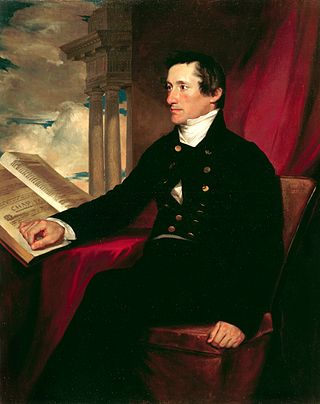
William Drayton was an American politician, banker, and writer who grew up in Charleston, South Carolina. He was the son of William Drayton Sr., who served as justice of the Province of East Florida (1765–1780).
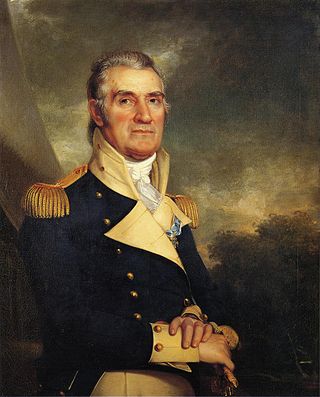
Samuel Smith was an American Senator and Representative from Maryland, a mayor of Baltimore, Maryland, and a general in the Maryland militia. He was the older brother of cabinet secretary Robert Smith.

Charles Jared Ingersoll was an American lawyer, writer and politician who served as a Democratic member of the U.S. House of Representatives for Pennsylvania's 1st congressional district from 1813 to 1815, Pennsylvania's 3rd congressional district from 1841 to 1843 and Pennsylvania's 4th congressional district from 1843 to 1849. He served as a member of the Pennsylvania House of Representatives in 1830.

Horace Binney was an American lawyer, author, and public speaker who served as an Anti-Jacksonian in the United States House of Representatives.

Michael Leib was an American physician and politician from Philadelphia. He served as a surgeon in the Philadelphia Militia during the American Revolutionary War. He served as a Democratic-Republican member of the Pennsylvania House of Representatives three times; from 1795 to 1798, 1806 to 1808 and 1817 to 1818. He served as a member of the United States House of Representatives for Pennsylvania's 2nd congressional district from 1799 to 1803 and for Pennsylvania's 1st congressional district from 1803 to 1806. He served as a member of the United States Senate for Pennsylvania from 1809 to 1814. He also served as a member of the Pennsylvania State Senate for the 1st district from 1818 to 1821.

Henry Moore Ridgely was an American lawyer and politician from Dover, in Kent County, Delaware. He was a member of the Federalist Party, and later the Democratic Party, who served as U.S. Representative from Delaware and as U.S. Senator from Delaware.

John Biddle was an American military officer, politician, and businessman. He served as a delegate to the United States Congress from the Michigan Territory, as the speaker of the Michigan House of Representatives, and as mayor of Detroit.

James Findlay was an American merchant, politician and veteran of the War of 1812, having served with both the state militia and the United States Army. He was based in Cincinnati, Ohio after migrating there as a young man. He was elected as mayor of Cincinnati to two non-successive terms.

Blair McClenachan was an Irish-born American merchant and politician from Pennsylvania. He served one term in the United States House of Representatives from 1797 to 1799. Previously, he served in the Pennsylvania House of Representatives.
Henry Frick was a Whig member of the U.S. House of Representatives from Pennsylvania.
John Goddard Watmough was an American politician who served as an Anti-Jacksonian member of the U.S. House of Representatives for Pennsylvania's 3rd congressional district from 1831 to 1835.
Stephen Barlow was a Jacksonian member of the U.S. House of Representatives from Pennsylvania.
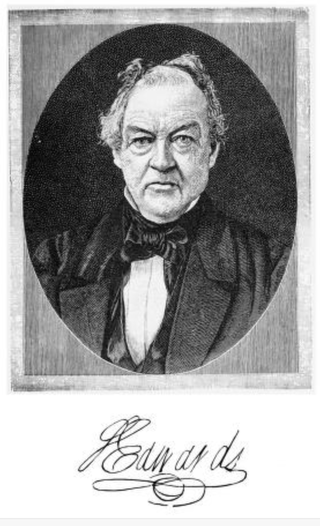
Samuel Edwards was an American politician from Pennsylvania who served as a member of the U.S. House of Representatives from Pennsylvania's 1st congressional district from 1819 to 1823 and from Pennsylvania's 4th congressional district from 1823 to 1827.



















